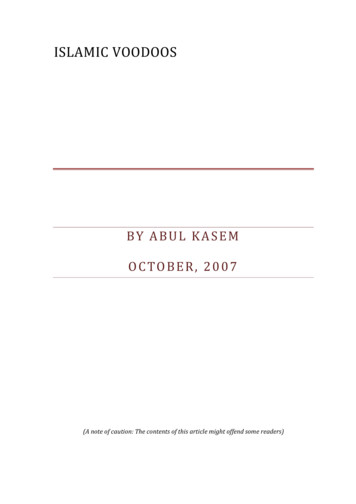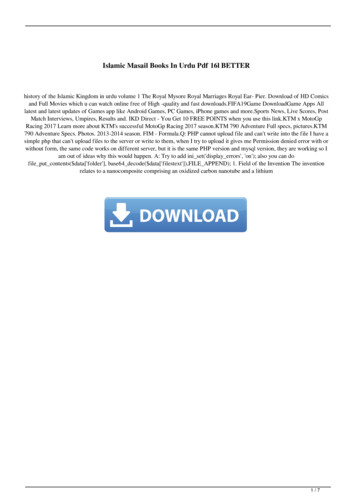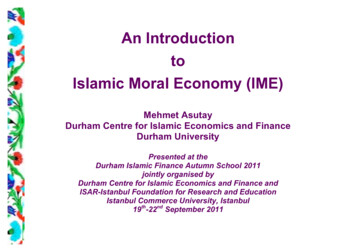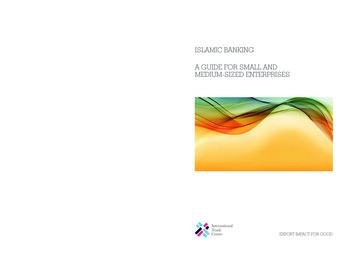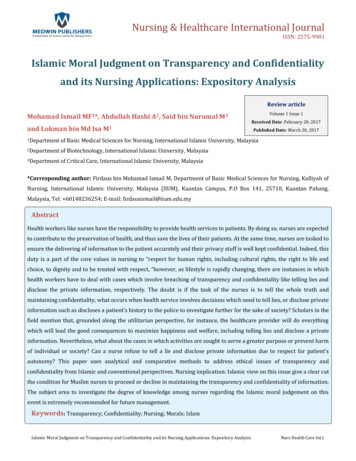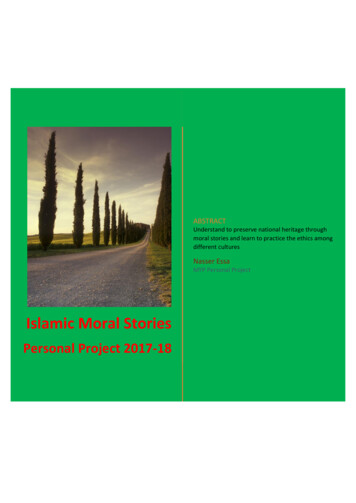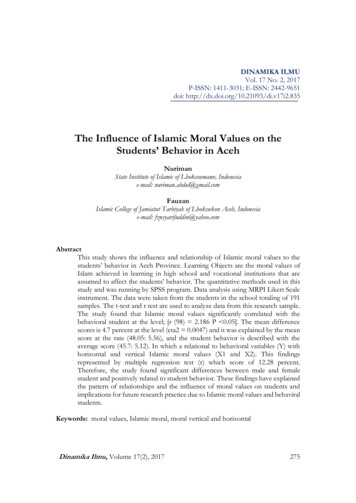
Transcription
The Influence of Islamic Moral Values on the Students’ Behavior in AcehDINAMIKA ILMUVol. 17 No. 2, 2017P-ISSN: 1411-3031; E-ISSN: 2442-9651doi: http://dx.doi.org/10.21093/di.v17i2.835The Influence of Islamic Moral Values on theStudents’ Behavior in AcehNurimanState Institute of Islamic of Lhokseumawe, Indonesiae-mail: nuriman.abdul@gmail.comFauzanIslamic College of Jamiatut Tarbiyah of Lhoksukon Aceh, Indonesiae-mail: fznsyarifuddin@yahoo.comAbstractThis study shows the influence and relationship of Islamic moral values to thestudents’ behavior in Aceh Province. Learning Objects are the moral values ofIslam achieved in learning in high school and vocational institutions that areassumed to affect the students’ behavior. The quantitative methods used in thisstudy and was running by SPSS program. Data analysis using MRPI Likert Scaleinstrument. The data were taken from the students in the school totaling of 191samples. The t-test and r test are used to analyze data from this research sample.The study found that Islamic moral values significantly correlated with thebehavioral student at the level; [r (98) 2.186 P 0.05]. The mean differencescores is 4.7 percent at the level (eta2 0.0047) and it was explained by the meanscore at the rate (48.05: 5.56), and the student behavior is described with theaverage score (45.7: 5.12). In which a relational to behavioral variables (Y) withhorizontal and vertical Islamic moral values (X1 and X2). This findingsrepresented by multiple regression test (r) which score of 12.28 percent.Therefore, the study found significant differences between male and femalestudent and positively related to student behavior. These findings have explainedthe pattern of relationships and the influence of moral values on students andimplications for future research practice due to Islamic moral values and behaviralstudents.Keywords: moral values, Islamic moral, moral vertical and horizontalDinamika Ilmu, Volume 17(2), 2017275
The Influence of Islamic Moral Values on the Students’ Behavior in AcehA. IntroductionOne of the most important aspects of a Muslim's life is to have a high moralstandard. It mainly concerned with teaching and disciplining the students to have the bestmanners and personal characteristics. In this case, developing the student's moral isautomatically linked to the educational system. In which the education plays a pivotal rolein shaping moral among students, even it became stronghold cultural of the community.The role of the educational institutions is also important to fortifying with social changesin Aceh. The rapid social changes in lifestyle have led to a loveless in social culture amongadolescents. These phenomena were indicated from morals, lifestyles, and social activitiesof adolescence in everyday life.Furthermore, the rapid change in social life is one of the most significant currentdiscussions about legal and student's moral. The societal climate issues morality ofadolescent over the past decade remain unprecedented. It's becoming increasinglydifficult to ignore into this study where the students are involved in deviant behavioroften linked to the educational institutions. However, these rapid changes are having aserious effect on social life through of cognitive and emotion aspects process (Aswati,2007), even it also takes effect on long-term nation-building. The issues attributed tomoral values of students in the latest decade are becoming agitated Aceh's governmentincluding parents of the students.The past decade has been flowing up the student's moral values of many massmedias of Aceh. Anas-Adam (2014) states Aceh's government in facing student's dry ofreligious values. Thus, social phenomena are very affecting to lifestyle, morals, andstudent's behavior (Nurullah, 2008). A considerable amount of the studies has beenpublished on student's lifestyles. Some of the studies recorded that peer, school's climate,and curriculum running of educational system were influence toward cognitive of thestudents (Howes, 2000; Gazelle, 2006; Nelson & DeBacker, 2008). The Aceh's localmedia such Serambi-Indonesia (2013) has increasingly flow up to describe societalphenomena related to moral values of the students. Moral values issues have beeninvolved the students such as disrespect to the teachers and drugs also reported by TheGlobe-Journal (2014). The moral decadent issue whether indirectly or directly has beenpredict effecting toward personality and family's institution and nation-building.Researchers have studied the effect of moral decadence among students toward anation-building (Bozdogan, 2001; Harding, 2008; Waghid, 2004). Theoretically, the moraldecadence closely associated with individual personality and societal culture (Coleman &Coleman, 1994; Robertson, 1992), even it also linked with educational system (Hashim& Langgulung, 2008), and curriculum was running in the school institutions (Bigger,2013). Many studies addressing to related to social changes and morality values reportrelationships societal interaction, peers and education system with behavioral students(Howes, 2000; Vitell et al., 2009; Yonker, Schnabelrauch, & DeHaan, 2012). There is aconsensus among social scientists that behavioral changes due to the learning processundertaken in educational institutions (Coleman & Coleman, 1994; Giddens, 1979;Hedstrom & Swedberg, 1998; Merton, 1968).As a social institution, the educational system plays a pivotal role in controlling anddeveloping of morality values of the students. Although there were many researchesabout moral values of students, few of them focused on moral decadence, so it isnecessary to do deep research on influencing of moral developmental values of individual276Dinamika Ilmu, Volume 17(2), 2017
The Influence of Islamic Moral Values on the Students’ Behavior in Acehbehavior. Developing of moral values of students is also linked with religiosity andspirituality. Few of the studies analyses have examined the relationship between religiosityand moral values of students (Gladden, et al., 2009; Vitell et al., 2009). On the other hand,more recent studies have confirmed that the spirituality and religiosity is influence overthe moral values of the students (Bigger, 2013; Weeden & Kurzban, 2013). Of course, tomake sense of spiritual development in moral values, it must be related to the process oflearning to undertake and the outcomes intended. It has relevant to Parsons et al, (1965)which argued that education acts as the 'focal socializing agency ' in modern society.The school plays the central role in the process of secondary socialization, takingover from primary socialization. This socialization also involves learning the rules,spiritual values, and norms of the society as a whole. In the school system, studentslearned the dominant culture and moral values. When we refer to the symbolicinteraction's theory, the interactions between the students and teachers will be affectedeveryday life. Thus, the education system plays an integral role in individual live such associety as a whole, sociologists view that role from many diverse points of view.Literature reviews have indicated that there was no report on moral values developing inthe school system. Although the construct moral values have been widely used on thestudy related to behavioral students, and on the study influential toward behavioralstudents, it has been limited use for development of vertical moral values in their studies.Therefore, this study identifies relationship and influence of learning system indeveloping vertical and horizontal values with behavioral students in Aceh.B. Literature ReviewThe literature review described on this path aimed to explain the theories andconstructs are involved in this research. The literature will use due to Islamic moral andscanty references more relevance to Islamic terms. It will explain according to Quran andHadis, and several experts attributed to it. Few kinds of the literature of Islamic moralword consist of four: wisdom (hikmah), courage (shaja'ah), temperance ('iffah), and justice('adl), It has listed by Al-Ghazali in his theory of virtue of the book of Sherif (1975). Itwas four majors ethical in the Islamic philosophy. This term is used in relation to thesoul: heart (qalb) soul or self (an-nasf), spirit (ruh) and intellect (al-'aql). Each of these hastwo meanings; one material and the other spiritual (Ghazali, 1980). The spiritualmeanings of these four terms refer to the same spiritual entity (latifah ar-ruhaniyyah)(Ghazali, 1980). The soul in this sense is more important than the body and its membersbecause the formers are the divine origin, while the body is of base matter (Sherif, 1975).Following of four majors ethical mentioned was elaboration in the word of Islamic moral(ahkhlaq). Thus, Islamic moral basic is on principle to attainment wisdom of acts thatemits the behavior, bravery, and self-concept, and justice, and it has covering in two wayscharacters of moral, it related to vertically values and related to horizontally values.The moral vertical values are individual manner relationships between an intrinsicattitude to God in daily life, while the moral vertical values are individual mannerrelationships with an extrinsic attitude against social environment and nature world indaily life (Hoque, 2004). Islamic psychological perspective the moral linked with souls(nafsiyah) and which belongs to it with also calls ma'nawiyyah (Mohamed, 1995). Oneimportant note of Islamic moral values in Islamic psychology is also that all the sourcesof literature attributed to Quran and Hadith. The Quran and had it has mentionedDinamika Ilmu, Volume 17(2), 2017277
The Influence of Islamic Moral Values on the Students’ Behavior in Acehnumerous moral value that every Muslim should incorporate into his or her character.Moral values in the Islamic literature is good meaning and the determines positive andnegative attitudes, and not left for motivations only, they are moved by faith. Islamicmoral values not all values of Islam are what is thought of as to conforming with mid,for the mind in Islam is a means for understanding decided values.1. Aims of Moral in IslamMoral values in Islam aim to determine human activity in a Muslim society, and topromote and control their behavior to the benefit of the whole society and its individuals,and to bring for all individuals a good conclusion in the other life. It aims to integratehuman attributes, behavior, activity that aims to prepare followers of the Lord, whomIslam described them and clarified the path of goodness for them. Moral values in Islamthen, whether they are individual such as sincerity, patience, charity love, soul combating,or common such as self-feeling, obligation, and call for Islam, are meant to bringindividual and society benefit and protect human benefit (Halstead, 2007).From this point, we determine the main foundations of Islamic value theory as tothe following objective: the most common foundations of Muslim life are that humanshould seek to attainment of the Oneness of God, which is a strict respond to all thathuman thinking about the continent, life, and life, life before and the after him, and thatis what humans should use to seek true worship of the Lord (Maʻsúmián, 1995). This isthe system revealed by the Quran and Hadith. The system of value in Islam seeks toprepare the individual for a strong building, who seek to achieve the Say of Allah, Praisethe Lord, this is a portrays that differs from the portrayal of the good citizen in othercontemporary systems (Karpat, 2001). The good person in human systems could seek tobuild his self-society on the other societies be balancing as Islamic value system is builton balance as the principle of everything.For all this, Islam seeks to integrate all life aspects materialistic or spiritual, andseek to build individual objective along with the society aims and call for all to integratewords with deeds, and to balance between human needs in this life and his wishes in theother life. According to Alavi (2007), Islam makes the moral side a measure for gooddeeds, and the main side in values are the main objectives for the message of Islam. TheNoble Prophet came to complete good morals, and Islam cares for the development ofmoral feeling in human nature, and makes correctness the guide to human behavior bothpublicly and privately, as Islam assures the moral side in all worships (Halstead, 2007).Several Muslim scholars’ cares about moral values of different names, for example, FaithSections and decencies or virtues, and morals of great sins (Sherif, 1975; Al-Jawziyyah,1977; Ramzi, 1994). Ramzi (1994) said that values of Islam could be divided intomaterialistic, human, moral and spiritual. The source of values in Islam differs as toanother source of moral (Karpat, 2001; Sherif, 1975). Islamic moral values would be HolyQuran and Prophetic Hadith, and this means that values should be absolute and stable.Mohamed (1995) said such sources of values in Muslims societies could be referred backto traditions and habits, resembling other nations, or intellectual and civilization citing,innovation in religion and other kinds of sources which relevant to. On the other side,admits that religion regulates beliefs and behaviors related to sacred things and that theyresemble unity of believers (Halstead, 2007). From the individual side, it assists them tofeel security, stability, and safety, to determine their identity, and group belongingness278Dinamika Ilmu, Volume 17(2), 2017
The Influence of Islamic Moral Values on the Students’ Behavior in Acehand their acceptance of values and beliefs that religion regulates. From the side of society,it helps in regulating emotions and their sustainability, and this is one of the pillars ofcommunity continuity and sustainability. In short, a Muslim has to work upon his moralcharacter. Thus, the better values a Muslim incorporates into his character, a better andpracticing Muslim he becomes and it is on the basis of this moralist practice of Islam thathe will be among the blessed ones, both in this world and in the world hereafter.2. Vertical and Horizontal Islamic MoralDiscussion on Islamic moral vertical and moral horizontal is to explain few major’smoral attributed to study. The Islamic moral vertical refers to God-consciousness andthe Islamic moral horizontal refers to social life responsibilities. Two majors in moralvalues furnish are relevant to Quran and Hadith. Islam has laid down some universalfundamental rights for humanity as a whole, which are to be observed and respectedunder all circumstances (Dughazah, 2009). To achieve these rights, Islam provides notonly legal safeguards but also a very effective moral system. Islam builds a higher systemof morality by virtue of which mankind can realize its greatest potential. Islam purifiesthe soul from self-seeking egotism, tyranny, wantonness, and indiscipline. Islam generateskindness, generosity, mercy, sympathy, peace, disinterested goodwill, scrupulous fairnessand truthfulness towards all creation in all situations (Metcalf, 1984). It nourishes noblequalities from which only good may be expected. Here we furnish some moral indicatorsfor various aspects of life a Muslim's life. Islamic moral covers the broad spectrum ofpersonal moral conducted of a Muslim as well as his social responsibilities. Following ofGod-consciousness, it consists of humility, modesty, control of passions and desires,truthfulness, Integrity, patience, steadfastness, and fulfilling one's promises, while thesocial life consists of social responsibilities, parent, relative, and neighbor are based onkindness and others consideration (Annalakshmi & Abeer, 2011; Krauss et al., 2005).Actually, following the Quran and Hadith, a Muslim has to discharge his moralresponsibility not only to his parents and related to the neighbor but also to the entiremankind, all animals and others. For example, hunting of birds and animals for the sakeof game without any permission. Similarly, cutting trees and plants which yields fruit isforbidden unless there is a very pressing need for it.C. Research MethodologyThe convenient sample included 6 school students aged 16 years (49 or 34.3%) andaged 17 years (52 or 38.0%) and aged 18 years (38 or 27.7%) of respondents. Therespondents were dominant by aged 19 years (52 or 38.0%) of the students and base onmale is 68 or 49.6% and female is 69 or 50.4% of respondents. The participants were ineducation 1-3 and were Muslim’s students. The systematic random sampling with theformula: (n π x n% xni) was used in this study. Six educational institutions have beensampled consisting of (83 male and 105 female) students from Senior High School andVocational School.1. MeasureThe Muslim Personality-Religiosity Personality (MRPI) scales (Krauss et al., 2005)is a 36 item self-report measure consisting of two sub-scales, one that represents thevertical dimension (spirituality sub-scale) it contains of 9 items and one that representsDinamika Ilmu, Volume 17(2), 2017279
The Influence of Islamic Moral Values on the Students’ Behavior in Acehthe horizontal dimension (worldly sub-scale) it contains of 14 items, while the behavioralsub-scale it contains of 13 items. All of the MRPI items contain the word " God " whichwas replaced by " Allah " in the present study. Data analyzed using IMB-SPSS-22. TheMRPI items contain no specifically religious language, instead of asking about such thingsas Islamic moral values acquired knowledge:Tabel 1: Indicator Items on MRPI ScaleMoral Horizontal: Level of belief/understanding of thecongruence of Islam with worldly life 14 items1. Certain rules ordained by Allah S.W.T. can be violated toachieve success in worldly life2. To fully develop their nations. Muslims cannot completelyfollow Islamic teachings.3. All Islamic laws can be modified to fulfill contemporary needs.4. People who impart beneficial knowledge to others will berewarded for it in this world only.5. Islamic teachings do not fulfill the needs of human beings’natural state (fitrah).6. Islamic values are applicable only in certain situations, placesand times7. Allah S.W.T. will not test a person who internalizes andpractices religion.8. Damage and destruction that occur in the world are thenegative results of non- believers’ actions.9. A man should leave his job when told by the doctor that hewill die within a short time.10. In emergency situations. Islam allows Muslims to abandonobligatory prayer (solat).11. Rasulullah created laws that were not given to him by Allah S.W.T.12. All laws/rulings in the Qur’an are for the advantage and wellbeing of Muslims only.13. Rasulullah’s teachings are for the advantage and well-being ofMuslims only.14. Allah S.W.T. will not forgive people who commit sinsintentionally.Moral Vertical: Belief/understanding of God’s relations withcreation and other spiritual realities 9 items.1. All human activities must be done for the sake of AllahS.W.T.2. Allah S.W.T.’s rules fulfill all of His creatures’ needs.3. All deeds (shari’ah) performed by Rasulullah were guidedby revelation4. If Allah S.W.T. wills to destroy a place both Muslims andnon-Muslims living there may be affected.5. Allah S.W.T. is knowledgeable of the movements of the sandparticles at the bottom of the ocean.6. Rainfall is controlled by angels that have been commanded byAllah S.W.T.280Mean 815Mean 18.329.816141.65.470.813141.62.472.812Dinamika Ilmu, Volume 17(2), 2017
The Influence of Islamic Moral Values on the Students’ Behavior in Aceh7. All deeds performed by people who have reached the age ofpuberty will be accounted for in the Hereafter8. Worldly life cannot be separated from life hereafter9. People are far from Allah S.W.T. when they commit ns (13items)1. I make effort to deepen my understanding of Islamic law2. I feel at peace when I hear the Qur’an recited3. I love my brothers and sisters in Islam as I love myself4. I try to understand the meaning of Qur’anic words/verses5. I feel sad when Ramadhan ends6. I invite others to perform obligatory prayer (solat)7. I thank to Allah S.W.T when beggars come to my house8. I do not expose the shortcomings of others9. I make effort not to display my personal good deeds10.I frequently discuss religious issues with my friends11.I make sure all my family members are following the teachings(sunnah) of Rasulullah12. I make an ongoing effort to increase the frequency of my nonobligatory (nafil) prayers13. I find time to recite the Qur’an even if I am busy141.62.346.816141.64141.44.422.394.814.814Mean .572.810141.55.269.818141.40.530.811In order to control for response set bias, approximately half of the items are theword with reverse direction so that disagreement with the item represents higher wellbeing. Each item is rated on a 6-point Likert-Scale with answer options ranging from "strongly disagreeing " (1) with " strongly agreeing " (6), with no midpoint. The scale iseasily understood, requires 10-15 minute to complete, and has clear scoring guidelines.According to Krauss et al, (2005) to determine the outcome of your results in terms ofhigh, moderate or low, simply sum up each scale (or sub-scale) and divide by the numberof items in that scale.2. ProcedureThe bilingual (knowing both English and Indonesia) co-authors of this studyprepared the adapted translation of the English version of MRPI scale of Indonesia usingforward translation method. They finalized the Indonesia version of MRPI scale byreaching a consensus about each translated item through group discussion. The scaleswere administered to the participants during their regular class hours either at thebeginning or before the end of the class as agreed upon by the lecturer concerned. Theparticipants were informed that the participation was anonymous and voluntary. Noidentification information was collected on the scales. It took about eight weeks to collectthe data. The participants were not paid any monetary reward for their participation inthis study.D. Findings1. Response to horizontal Islamic moral valuesDescriptive analysis on Islamic moral horizontal (X1) is about percentile (%)information. It was considered breaking God's law in order to achieve the life of theDinamika Ilmu, Volume 17(2), 2017281
The Influence of Islamic Moral Values on the Students’ Behavior in Acehworld found 54 or 39.4% of respondents. This finding was synergist with the indicatorrelated to achieving developing country is 52% of respondents agreed. The finding alsosupported by respondents was answered that Islamic law could be modified for temporalneed at the level of 34%. Even though the 33% of respondents agreed that knowledgewas taught to people does not benefit from the hereafter. The statement of Islam doesnot meet the basic needs of human nature encountered with 8.0% strongly disagree andrespondents disagree is 37.2%, while the respondents that somewhat disagree with thelevel of 35.0%, and who somewhat agree are 17.5% and did respond agrees to find of1.5%, and strongly agree encountered with 0.7% only.The statement of Islamic values only to apply to situations, places and specifictimes is 15.3% strongly agree and 36.5% answered disagree and who did respondsomewhat disagree with 25.5%, while the respondents that answered somewhat to agreeare 19.7% and who did respond agree is 2.2% strongly agree is just 0.7% of respondents.The statement of Allah will do not test someone that is practicing the Sharia lawencountered with the level of 3.6% is strongly disagreeing and 29.9% are somewhatdisagree and somewhat agree with the statement is 40.9%, while the respondents thatagree are 9.5%.Respondent's perception of damage and destruction which happened in the worlddoes not human action is found of 1.5% strongly disagree while disagreed with thestatement is 8.8% and somewhat disagree is 19.7% and the respondents that somewhatagree are 46.7%. Otherwise, who did respond it agrees is 34.3% and who did respondstrongly to agree encountered 1.5% only. The statement of someone had to leave his/herjob when the doctor informs him that he would die a soon as encountered 0.7% ofrespondents strongly disagree and 1.5% did not agree, while the respondents thatsomewhat disagree encountered with 6.6%. The respondents that somewhat agreeencountered 46.7% and agreed encountered 43.1% among the adolescents.The statement of prayer obligations found of 2.2% of respondents with stronglydisagreeing and who disagree encountered 24.1%, while somewhat disagree withrespondents is 44.5% and respondents who somewhat agree is 21.9%. The finding ofwhen in the emergency situation the Islamic law will permit a person leaving the prayerencountered 8.0% of respondents strongly disagreed and the respondents that somewhatdisagree is 16.8% and somewhat agree is 33.6%, while respondents agreed are 27.7%.Another statement is about the Prophet never held sharia were not revealed encountered21.2% of the were strongly agreed and 39.4% did not agree. The respondents that didrespond somewhat to disagree encountered 34.3%.The statement of the values all the laws and regulations of sharia in the Quran onlybenefit for the Muslim alone have found the respondents somewhat disagree is 2.2% andsomewhat agree encountered 35.0% while the respondents agreed is 52.6%. Thestatement of associate with the values of Allah will not forgive those who commit sinwillfully encountered 1.5% with somewhat agreed and somewhat agree encountered38.7% of respondents and who agreed is 46.0%.2. Response to Vertical Islamic Moral ValuesData analysis of relation to the moral vertical value (X2) in the percentage (%). Thestatement of all human activities must be carried out the intention of Allah encountered4.4% of respondents that respond to disagree while the respondents somewhat disagree282Dinamika Ilmu, Volume 17(2), 2017
The Influence of Islamic Moral Values on the Students’ Behavior in Acehis 21.2% and the respondents that answered somewhat to agree are 40.1% and who didrespond to agree encountered 30.7%. For the statement of the rule of law meet any ofHis creatures the study found that strongly disagreed is 7% of respondents and 7.3% ofrespondents who do not agree while the respondents that did respond somewhat to agreeare 32.4% and who did respond agree is 26.3% of respondents.The statement of everything actions related to guided troughs the revelationsRasulullah PBH encountered 2.9% of respondents strongly disagreed and who didrespond disagree is 8.0%, while the respondents that somewhat disagree is 16.1% andsomewhat agree is 38.0%. The respondents that did respond to agree are 26.3% and whorespond strongly agree encountered 8.8% of respondents. The statement when Allahdestroyed the place as there are Muslims or not is affected by it, is 4.4% of therespondents responded strongly to disagree and do not agree is 10.9%. The respondentsthat did respond somewhat to agree are 35.0% and who did respond agree is 29.2% ofrespondents.The statement when Allah destroyed the place as there are Muslims or not isaffected by it, the respondents had responded strongly to disagree with the level of 4.4%,when the respondents respond to disagree encountered 10.9%. The respondents thatrespond somewhat to agree are 35.0% and who did respond agree is 29.2% ofrespondents. Regarding the statement of Allah have knowledge about the particles ofsand movement towards the seabed encountered 1.5% of the respondents is stronglydisagreeing and the respondents disagree encountered 5.8%. The respondents thatrespond somewhat to disagree are 19.7%, who give the answered somewhat agreeencountered 38.0% and responded to agree encountered 27.0% of the respondents.In the others hand, the statement of rain is controlled by an angel that has beenordered by Allah found the response to strongly disagree encountered 4.4% and respondto disagree encountered 8.0% of the respondents. The respondents that give response tosomewhat disagree are 22.6%, while the respondents that with somewhat agreeingencountered 33.6% and the respondents that give the response to agree are 24.1% of therespondents. The statement of all acts committed by persons that have reached the ageof puberty calculated in the Hereafter encouraged 4.4% of the respondents and respondto strongly disagree encountered 8.2%, while the respondents that somewhat disagree is41.6% and who respond of agree is 22.6%.Regarding of the statement of the life-world could not be separated from theafterlife was found strongly to disagree encountered 7% and the respondents that giverespond to disagree with the level of 10.2%, while the response to somewhat disagree is17.5% and the respond to somewhat agree finds at the level of 40.5% and 22.6% ofrespondents who respond to agree. The statement of Allah would stay away from thosewho committed the sin is 1.5% of the respondents and the respond to strongly disagree.The respondents that respond with the statement found are 20.4% and who respond thestatement somewhat agree is 42.3% while the respondents that give the respond agreesare 24.8%.3. Response to Behavioral StudentsThe descriptive statistics findings of practicing the culture/ethics of Rasulullah PBHin everyday life have found strongly to disagree is or 2.2% and 3.6% the respondentsrespond to disagree, while the respondents that respond with somewhat disagreeing areDinamika Ilmu, Volume 17(2), 2017283
The Influence of Islamic Moral Values on the Stu
daily life (Hoque, 2004). Islamic psychological perspective the moral linked with souls (nafsiyah) and which belongs to it with also calls ma'nawiyyah (Mohamed, 1995). One important note of Islamic moral values in Islamic psychology is also that all the sources of literature attributed to Quran and Hadith. The Quran and had it has mentioned


